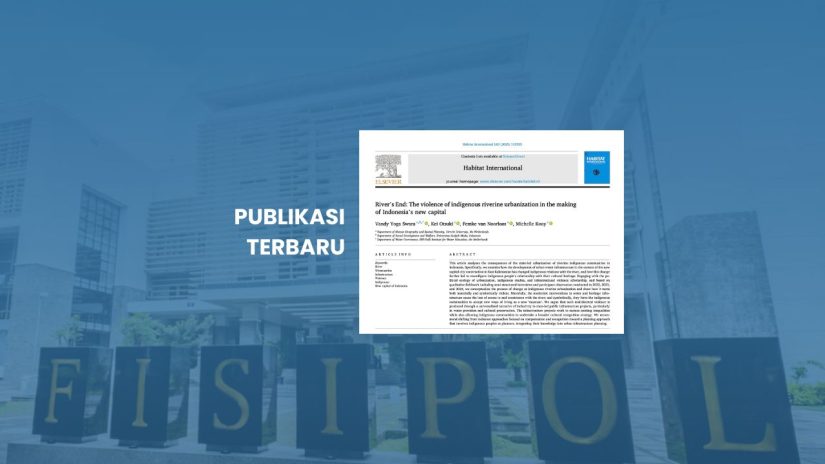
Vandy Yoga Swara, lecturer at the Department of Social Development and Welfare (PSdK), Faculty of Social and Political Sciences (FISIPOL) Universitas Gadjah Mada, has recently published his latest scholarly work in the international journal Habitat International (Elsevier). The article, titled “River’s End: The Violence of Indigenous Riverine Urbanization in the Making of Indonesia’s New Capital,” was co-authored with Kei Otsuki and Femke van Noorloos (Utrecht University, Netherlands) as well as Michelle Kooy (IHE-Delft Institute for Water Education, Netherlands).
The article examines the consequences of water infrastructure development in Indonesia’s new capital city (IKN), particularly its impact on the Balik indigenous community living along the Sepaku River, East Kalimantan. Fieldwork was conducted between 2022–2024 through interviews and participatory observation.
Findings reveal that water infrastructure projects for IKN have drastically altered the Balik people’s relationship with the river, which has long served as both their source of livelihood and cultural identity. The loss of access to the river affects not only basic needs such as water, but also symbolic aspects—including the relocation of ancestral graves and disruption of cultural rituals tied to the river.
The authors describe this process as a form of “indigenous riverine urbanization violence,” in which modern infrastructure development imposes both material violence (loss of water access and land) and symbolic violence (imposed ways of living that distance communities from their cultural heritage).
The article stresses the need for a paradigm shift in development planning—beyond mere compensation and recognition—by truly involving indigenous communities as planners. Integrating local knowledge into urban infrastructure design is essential to prevent new forms of injustice and vulnerability.
This publication adds to the growing international contributions of FISIPOL UGM scholars in the fields of development, social justice, and sustainability in Indonesia.
Relevant SDGs
This article is strongly connected to several Sustainable Development Goals (SDGs):
-
SDG 6 – Clean Water and Sanitation: highlighting the loss of indigenous communities’ access to rivers as a vital water source.
-
SDG 10 – Reduced Inequalities: addressing the marginalization of indigenous peoples in the context of state-led megaprojects.
-
SDG 11 – Sustainable Cities and Communities: emphasizing the need for inclusive urban planning that respects cultural heritage.
-
SDG 16 – Peace, Justice, and Strong Institutions: calling for just governance that ensures indigenous rights are protected in development.
-
SDG 15 – Life on Land: recognizing the importance of protecting ecosystems and traditional knowledge tied to land and rivers.
